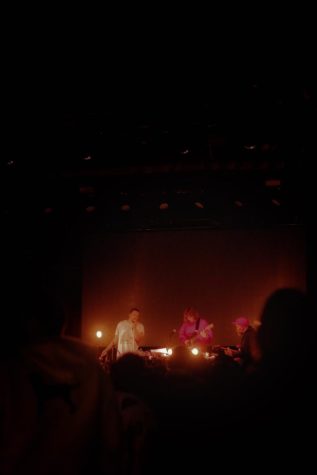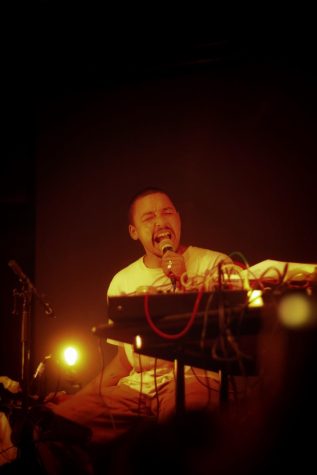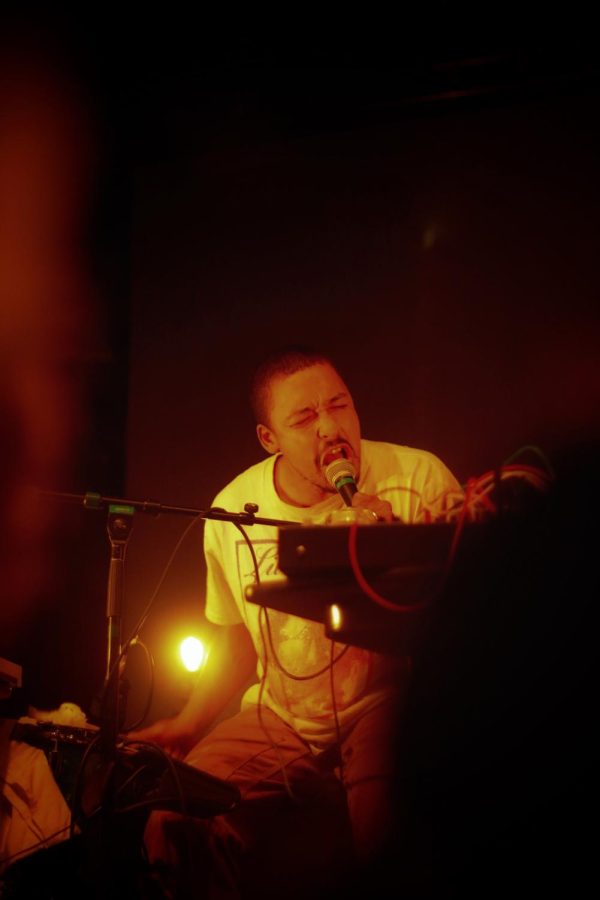Few artists can create an environment that is both thrilling and emotionally intimate. On the evening of Monday, May 9, Dijon proved himself to be a member of that rare category. With his emotive, raw voice and boundary-breaking instrumentals, he gave an electrifying and emotional performance at the Royale Boston. Dijon magnetizes his audiences with gritty, layered vocals, complemented by digital beats – a blend of basslines and subtle drums.
Throughout the show, Dijon repeatedly checks the temperament of the room by asking the audience, “How are you feeling?” Fans excitedly chant “woo’s” and “yeah’s” almost instinctively to his questions.
Dijon started off the night with one of his catchiest tunes, “Big Mike’s.” The name is fitting for such a triumphant song full of energy. The beautiful storm of instruments included guitar, organ, drums, clarinet and piano, which sometimes softened to emphasize Dijon’s sweet melodic yearnings. Every fiber of his being bleeds with each controlled quiver and tremble of his emotive voice.
Dijon’s vocal talents are brilliantly illustrated in the second song he performs, “Sweet Thing,” as he stretches the range of his signature baritone voice, going from breathy low notes to singing in falsetto and sprinkling in low growls.

His knack for musical balance did not go unnoticed as he masterfully used two instruments simultaneously. Dijon did not miss a beat while he holding the mic in his left hand and bass drumstick in the other. His soulful voice and drumming engaged in a beautiful tango as he pivots between elements with ease.
Dijon proceeded to introduce his bandmates: Jack Karaszewski was on the guitar, bass and modular synthesizers; Mike Gordon, aka Mk.gee, was on the guitar and keyboards; and Ryan Richter was on lap steel guitar and bass.
The audience went wild as Dijon and the band performed the third song of the night, “Nico’s Red Truck.” The nostalgia of this song hits home; if you could magnify audience members’ thoughts, you would drown in visions of swing sets, CapriSuns, Happy Meals and careless summer nights. The crowd engaged with sentimental intensity as Dijon repeated each lyric of the chorus, “I had a wide angle, smile and a mouth full of gold/ Candy eyes, candle eyes burning bright down the road/ Through Carolina, warm air Carolina.” The sorrowful quality of Dijon’s vocals reverberated throughout the performance.
Dijon ventured off from the studio version, placing a long break between the second and third verse. The mild disappointment that I had as the music seemed to stop quickly disappeared as Dijon began to engage his storytelling capabilities in a rap verse about the anxiety of losing memories. He intonates while rapping but soon his words start to descend into a ‘lyrical slushy,’ slurring lyrics with minimal clarity, which could be a purposeful symbol of blurriness or fading memories.
One of the standout songs was “Violence,” which left me with chills and goosebumps. The strain in his voice is so beautifully executed, emphasizing the desperate tone of the song that is begging for the affections of a woman by the name of Violet. “I’m begging you, Violet,” he sings in frustration. The soft humming and slow pacing of each piano key is an effective buildup to tumultuous verses in the second half of the song, a chaotic and stunning auditory representation of the feeling of anguish.
A simple-sounding song sticks out like a fly on a wedding cake when you explore the catalog of a maximalist experimentalist like Dijon. The guitar-driven ballad, “Dance Song,” is a quintessential fit for a couple looking to bask in pure love while slow-dancing. The simple melodies and mellow tone set a candlelit atmosphere empty of clutter. The buttery-smooth vocals of Dijon and bluesy guitar riffs resonate with another romantic ballad, “Easily,” by Bruno Major.
The second to last song “Cannonball” is the most intimate song of the night. Dijon’s bandmates leave Dijon to sing solo to the audience. Dijon immediately immerses the listener in his rollercoaster of emotions. The song is similar to Frank Ocean’s “Rushes,” with its rich keyboard notes and mosaic elements. They are also similar in the sense of having purposefully fragmented sections that take audiences to unexpected detours. For “Cannonball,” the audience delightfully accepts new paths.

For the last song, “Rodeo Clown,” Dijon’s bandmates rejoin him. Dijon’s throaty and strained vocals complement the folksy texture of the song. It is one of the most emotionally raw performances of the night. If Forest Gump was transported to the 21st century, the soundtrack of his love life would be this record, while his beloved Jenny brought nothing but disappointment after disappointment. “What are you so afraid of?” The simple line rips your heart out as you hear every shake of Dijon’s voice.
Dijon performs with such a refreshing sense of raw vulnerability that it transforms the concert into a cathartic event. He is an artist to watch out for in the future as his humility and talent are distinct and make him a rare diamond among rocks.
Samourra Rene can be reached at [email protected].




















